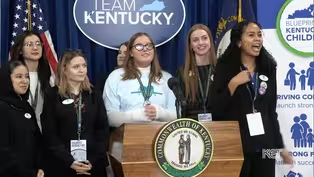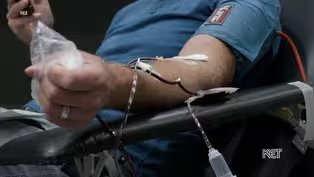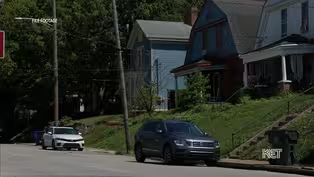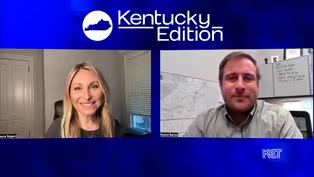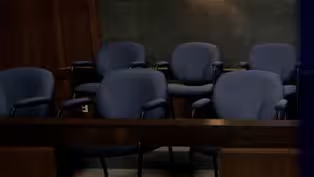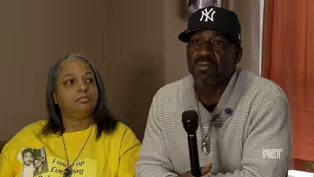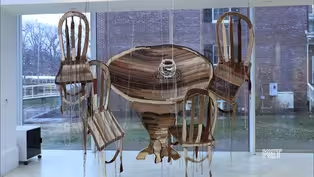
Certificate of Need Explained
Clip: Season 2 Episode 169 | 4m 3sVideo has Closed Captions
Certificate of Need is a complicated law that regulates the healthcare industry.
Certificate of Need is a complicated law that regulates the healthcare industry and it can be difficult to understand how it works. Our Clayton Dalton sat down with Sarah Ladd, a health and policy reporter, to get the breakdown.
Problems playing video? | Closed Captioning Feedback
Problems playing video? | Closed Captioning Feedback
Kentucky Edition is a local public television program presented by KET

Certificate of Need Explained
Clip: Season 2 Episode 169 | 4m 3sVideo has Closed Captions
Certificate of Need is a complicated law that regulates the healthcare industry and it can be difficult to understand how it works. Our Clayton Dalton sat down with Sarah Ladd, a health and policy reporter, to get the breakdown.
Problems playing video? | Closed Captioning Feedback
How to Watch Kentucky Edition
Kentucky Edition is available to stream on pbs.org and the free PBS App, available on iPhone, Apple TV, Android TV, Android smartphones, Amazon Fire TV, Amazon Fire Tablet, Roku, Samsung Smart TV, and Vizio.
Providing Support for PBS.org
Learn Moreabout PBS online sponsorshipNow lawmakers in Frankfurt have long considered making changes to the state's certificate of need requirement.
And if you're wondering what a certificate of need requirement is, you are not alone.
It is a complicated law that regulates the health care industry, and it can be very difficult to understand how it works.
Our Clayton Dalton, though he sat down with Sarah Ladd, a health and policy reporter, to get some understanding and to break it all down.
Certificate of Need is one of those issues that it is affecting a lot of people, whether or not they know it.
But and this is something lawmakers have been talking about.
I mean, they spent for the past four years, there been at least one bill in the General Assembly that seeks to reform a certificate of need or con, as some people say.
And last year, there was a task force that spent six months studying it.
And at the end the result was we need to study it more because it's that complicated.
Certificate of need, sometimes referred to as con is a government mechanism designed to limit competition between health care facilities.
Some describe it as a permission slip required by law for medical facilities that want to expand their services.
Its ultimate goal is to ensure hospitals and vital health care services remain open and accessible to patients.
Sarah Ladd, a health and policy reporter, uses a simplified analogy to break it down.
Let's say that I want to open a lemonade stand in front of my house.
Now my neighbor will say Susan has been selling lemonade in front of her house for years and people like her lemonade and it's fine, but I just wanted to sell it, too.
And but Susan is worried that if I open a lemonade stand, I might drive her out of business.
Maybe because there's more competition now, she might not be able to keep her prices the way they are.
Or maybe she can't afford to keep her stand.
So she's losing or she might lose it.
And so I can't get permission from our local government to open my stand because they need to protect her and the service it provides.
Now I'll type or simplified, but and the person that you're not hearing from in this conversation is the neighbor across the street who wants options on where he buys his lemonade.
There are fears that intense reforms to the certificate of need mechanism could hurt the state.
Overall, existing hospitals have voiced concern that without consent, new hospitals would be able to cherry pick patients for expensive services, leaving old hospitals with patients on public assistance.
And so essentially, the hospitals then lose the income they would get on elective surgeries or things that are more lucrative for them.
So that in itself, what they need, that income, that in itself could drive them to a point of closing some services, like really limiting what they offer and then could eventually lead to closure.
Is the argument there.
And that's a very serious concern in a state where we have tremendous shortages in primary care and other fields.
Freestanding birthing centers, which are especially sized standalone facilities for low risk births, are effectively prohibited in Kentucky under this certificate of need requirement.
But a Senate and House bill aim to change that.
Northern Kentucky Senator Shelly Funky Frohnmayer has introduced Senate Bill one three and she's essentially trying to remove the con requirement, specifically for freestanding birth centers so that they can come to Kentucky so they can open in Kentucky.
This is something that there is a companion bill, if you will, in the House of Representatives.
Neiman's has filed that.
So there's there's a theme of lawmakers coming together and wanting that part of it reform for sure.
Senator Shelley funky from Iowa's bill.
Senate Bill 103 and Representative Jason Nimitz's Bill House Bill 199 have both been assigned to committee and await vote there.
For Kentucky Edition.
I'm clayton dalton.
Thank you so much.
Clayton bills about freestanding birthing centers are not new to the kentucky general assembly.
Republican representative Jason Meme has sponsored House bill 129 and the 2023 legislative session, which is identical to his bill this year.
Children's Advocacy at the Capitol
Video has Closed Captions
Clip: S2 Ep169 | 2m 38s | Governor Beshear and members of the General Assembly joined students for a rally. (2m 38s)
Cold and Snow Cause Blood Shortage
Video has Closed Captions
Clip: S2 Ep169 | 58s | Kentucky Blood Center is again dealing with a blood shortage caused by the recent weather. (58s)
Lawmakers Debate Section 8 Housing Vouchers
Video has Closed Captions
Clip: S2 Ep169 | 3m 25s | Legislation to prevent cities from forcing a property owner to accept Section 8. (3m 25s)
Mid-Week Political Check-In (1/24/24)
Video has Closed Captions
Clip: S2 Ep169 | 5m 6s | Laura Rogers speaks with NPR's Ryland Barton about other measures under discussion. (5m 6s)
Potential Pay Raise for Jury Duty
Video has Closed Captions
Clip: S2 Ep169 | 44s | Jury duty would pay more under a bill that advanced out of a House committee. (44s)
Victims of Gun Violence Comment on Safer Kentucky Act
Video has Closed Captions
Clip: S2 Ep169 | 3m 43s | Krista and Navada Gwynn lost their 19-year old son to a drive-by shooter in 2019. (3m 43s)
Video has Closed Captions
Clip: S2 Ep169 | 3m 58s | An artist crochets a re-creation of her childhood home. (3m 58s)
Providing Support for PBS.org
Learn Moreabout PBS online sponsorship
- News and Public Affairs

Top journalists deliver compelling original analysis of the hour's headlines.

- News and Public Affairs

FRONTLINE is investigative journalism that questions, explains and changes our world.












Support for PBS provided by:
Kentucky Edition is a local public television program presented by KET
